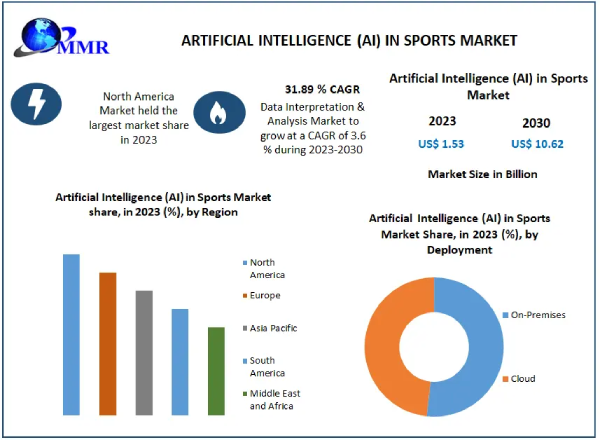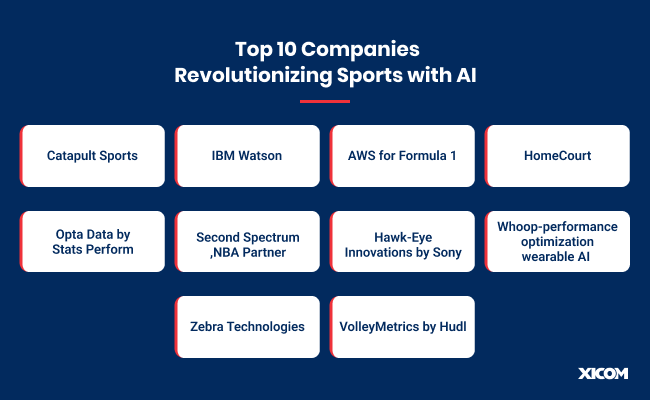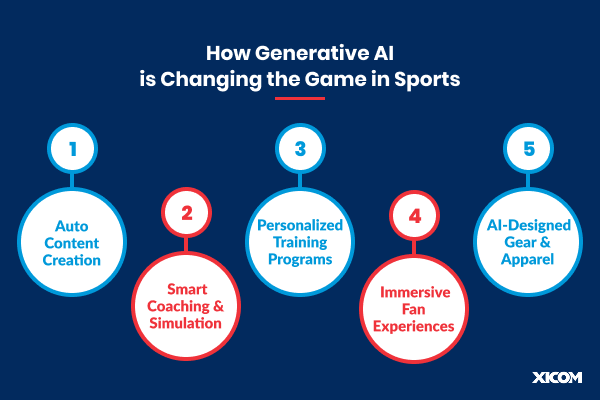Jun 2, 2025 App Development
AI in Sports: Enhancing Performance & Engagement with Real Use Cases and Benefits
Jun 2, 2025 App Development
Table of Contents
Jun 2, 2025 App Development
Sports industry is evolving everyday! With new formats of games, to bigger tournaments, and new teams pouring in, it is significantly changing the outlook of the game, increasing viewership and making the entire industry more professional than just a matter of co-curricular existence.
The way the sports industry is transforming and becoming more competitive, it is opening doors for innovation. From injury prevention to smarter training and tracking opponents, AI is leading the way.
It is revolutionizing how athletes train, perform, or strategize; viewers engage with the game, and broadcasters stream.
Here in this blog, today, we will cover how AI in sports is revolutionizing the entire scenario. Along with real world use cases, benefits, and business opportunities.
Keep on reading to find out how you can benefit from this USD 1.53B market.

The global AI in sports industry which was valued at USD 1.53Bn in 2023 is expected to rise at a CAGR of 31.89% and reach USD10.62Bn by the end of 2030.
For further understanding, AI in the sports industry employs advanced algorithms to analyze data sets that help players in improving performance and revolutionize fans’ engagement. It encompasses predictive analytics for broadcasters, preventing injury with in-advance detection, and helping understand competition closely with various AI tools available.
As AI continues to significantly impact various sectors, sports is also not left behind. The integration of AI and sports is significant as the industry is experiencing a shift towards a more data-led approach, emphasizing AI’s integral role in fostering advanced and effective sports strategy and management.
AI stands at the forefront of providing teams, coaches, organizations, and players with endless data, like real-time insights, predictive analysis, and automation to give them a competitive edge like never before. From creating a fully customized fan experience to optimizing players’ health, or automating training with machine learning, AI is unstoppable.
Here is how AI’s use in sports is transforming the overall current world scenario:
Injuries can ruin performance, cost teams heavily, or even worse ruin players’ careers. An injury occurs when the posture is incorrect, but how would you judge that with your naked eyes? Impossible right? This is when AI steps in. the smart application not only records videos of players training, but also generative AI in sports warns about it.
On the other hand, teams can deploy AI models to analyze movements through wearable technologies and warn beforehand if an injury can occur. Concerned persons can take these warnings into consideration and take actions.
Standard gears are not suitable for every player. This is exactly where AI steps up the game. AI use in sports equipment can monitor biometrics, track movement patterns, and generate performance feedback on the basis of data & history fed into its system.
For instance, players use AI powered cricket bats in their practice session. This smart bat has sensors, edge computing, and microsoft AI to measure timing, power, and quality of shots. Later it sends real time data to coaches to help players refine their mechanics.
Generic training may lead to subjective feedback that may or may not work for every athlete. In the current competitive world, it is eye for detail that matters and needs to be perfected.
This is why coaches and organizations are collaborating with companies that can provide assistance with AI for sports training. Tools that help with motion tracking, indicate biometric signals like heart rate, muscle fatigue, etc., and generate performance metrics can help them in delivering adaptive and tailored training programs to prepare for the big competition.
Tools powered by machine learning (ML), AI models, smart dashboards, and computer vision help in identifying gaps in techniques and track load balance across the limbs to further suggest corrective measures & exercises to optimize form.
What happens on youtube? You search for one type of content piece, and later you’re filled with similar suggestions. That is how AI works!
Going by the similar example, AI technology in sports apps try to build a hyper-personalized experience for the fans by putting to use their watch history, demographics, intent, and other factors.
These insights provide data to AI algorithms to review fans activities across various channels and suggest content like highlights, interviews, behind-the-scenes or more. Even iGaming apps in sports use AI models to create personalized gaming experience for players.
In competitions, one wrong judgement can make a player lose his gold. Subjective judging in many sports have been prone to errors, bias, and inconsistency.
To overcome these challenges, event organizers and federations are increasingly incorporating AI-enabled judgment systems by partnering with AI development companies. These AI development services use machine learning, motion tracking, computer vision, and machine learning algorithms to track players’ performances.
The AI technology in sports measures factors like from, precision, speed, rotation, and timing to generate accurate results, by combining it with thousands of prior examples and sports criteria fed into the system.
Every player is different, so is their training program. One-size-fit-all programs do not give exceptional results, and coaches realise its importance in the current age. This is why AI in sports is put to use to create hyper-personalized training programs for athletes that work on their individual metrics, physical conditions, and physical recovery time period.
Athletes are putting to use these customized regimes and yielding better performances.
Video footage has been long used by coaches and analysts to review team performances. It was used to analyze opponents, their game play, strategies, positioning, and more. However, the manual process was very time consuming and error-prone.
Whereas, now the AI technology in sports, that uses methods of deep learning, pattern recognition, and computer vision, automatically tracks players, formations, key moments, in real-time to deliver instant results.
It happens with the help of live footage captured from multiple camera angles and real-time pattern recognition.
Impact of artificial intelligence and sports is not just limited to at-home viewing experience. But, it is also revolutionizing the live stadium experience with its smart technology. Today, AI enabled ticketing systems use facial recognition systems to quickly let fans enter the stadium without the need of standing hours in long queues. Additionally, the blockchain technology prevents ticket fraud and ensures a secure entry experience for all.
Sports journalism requires a huge man force of reporters to cover a big event, like olympics or cricket world cup. But AI, with NLP, has reduced the need of the human workforce.
It automatically transforms scores and stats into compelling, human-like reports. The AI system automatically gathers data by using computer vision technology to provide live reports during the ongoing match. It helps in streamlining the reporting process and fans engaged throughout.
No, artificial intelligence in sports is not a theory. Here are top companies around you that are using AI to revolutionize the game through every aspect.

Works on machine learning, AI, and natural language processing to deliver real-time scores, analytics, and predictions. Its AI generated match reports assist many commentary and broadcasting channels like ESPN, Amazon Prime, Premier League Clubs, etc.
Second Spectrum works on AI plus computer vision. It precisely track every player and ball movement in real time to generate advanced metrics like shot quality, defensive pressure, and space creation. It is used to enhance, both, team strategy and fan broadcasting. Some of its key users are Premier League, NBA, and MLS.
It works on the technology of vision-based ball tracking plus real time rendering to enable DRS system in cricket, goal-line tech in football line calling in tennis. It is also used in VAR systems with AI enhanced replays. Therefore, becoming the most used AI technology in sports by ICC, FIFA, UEFA, ATP, and WTA.
Whoop makes wearables with biometric sensors and AI algorithms to track sleep, strain, and recovery for athletes. Its AI mechanics provide daily readiness scores and health alerts and also helps teams to optimize training and prevent injuries. It is majorly used by Olympic athletes, NFL, CrossFit, and PGA Tour.
With RFID chips and AI pattern recognition, it is used for NFL player tracking. It has its sensors embedded in players’ shoulders pads to track speed, acceleration, route precision and their impacts. Data collected from these wearables are used for training, safety, and broadcast enhancement. NFL, NCAA, and other training facilities are some of its key buyers.
IBM Watson is an AI technology in sports designed for Tennis broadcasting. It works on NLP, data insights and AI summarization to generate highlight reels based on crowd gestures, noise, and stats. It powers “Watson Insights” during Wimbledon for real-time match statistics. It also helps broadcasters to deliver customized fan experiences. Other main users of IBM Watson are US Open and Masters Golf.
It is an AI based athlete monitoring tech that works with AI dashboards and video sync for wearables. It is used to track players’ heart rate, workload, movement patterns, and sprint metrics. Coaches and management use this AI technology in sports to manage fatigue and improve decisions for the big day. It combines video analysis with GPS data to give precised results. NCAA, AFL, EPL clubs, NBA teams, and international rugby are some of the major names that take benefits of AI in sports with Catapult.
This video AI with pattern recognition AI technology was made for volleyball match analysis. It works on analyzing the game footage to identify teams’ strengths and weaknesses. It also shares AI powered post-match breakdowns and game plans.
Helping colleges to recruit based on performance analytics is considered to be one of its best features. It is used by NCAA and other international volleyball teams.
AWS uses technologies like predictive AI models and real-time data ingestion in AWS to create race strategies for Formula 1 drivers. It runs millions of simulations to suggest optimal pit stopping time with precision. Also, helps with analyzing car telemetry and race conditions to adjust strategy; and enhance overall fan engagement with F1 insights. All F1 teams use it by partnering with AWS.
HomeCourt, an AI based basketball coaching app works on the technology of AI, phone camera, and motion capture. It tracks footwork, shots, and form using your phone’s camera. It offers drills and feedback by using AI. This is why it is majorly used by NBA players and youth coaches around the world.
AI is rapidly transforming the landscape of the sports industry. It is playing a crucial role in bringing revolutionary changes in how players train, teams strategize, fans engage, and organizations operate.
Considering the current scenario, the future of artificial intelligence in sports looks even more promising with deeper integrations, intelligent decision making, hyper-personalized experiences, and improved overall performance across all levels.
One of the key areas where AI is set to transform sports is performance analytics. Modern AI algorithms process an insane amount of data gathered through wearable sensors, IoT enabled devices, and smart cameras. This data includes players’ biomechanical patterns, heart rate, fatigue level, and movement. In future, AI will also help in providing players with predictive insights and real time feedback to avoid injuries, optimize their training, and refine their techniques with precision.
For game strategy and coaching, AI will play an even more critical role. Machine learning models will analyze previous games, check opponents strategy and suggest the best game plan. It will give coaches the power to make data-driven decisions with the help of simulating various game scenarios. AI-based talent identification tools will also become more refined and help in identifying talent at an early stage with greater accuracy.
Fan engagement is another segment where generative artificial intelligence for sports will make a profound impact. Custom content delivery, AI chatbots, and other immersive technologies like AR/VR will let fans experience and engage with games in newer ways. AI sports management will also enable automated ticketing systems that will work on facial recognition system to let quick entry to the crowd, enhancing both convenience and security.
There will be AI commentary in sports games. Yes! AI’s integration into sports journalism will transform how stories will be told. There will be automated highlight reels, AI written match analysis and reports, data driven commentary will become common.
The future of AI in the sports industry will be about intelligent automation, better engagement, and improved performance. As AI tools for sports training, management, and fan engagement become more sophisticated and accessible, the entire sports industry will benefit from the new age precision, innovation, and customization.

Generative artificial intelligence is transforming the sports industry by enabling creation of new strategies, insights, and content through modern AI machine learning models. One of the most impactful roles of generative AI in the sports industry is automated content generation. It automatically produces commentary, match reports, highlight reels, and player statistics. Many sports media firms use generative AI to share real-time updates and hyper-personalised content with fans to keep them engaged on the platform.
In the process of coaching and performance analysis, Generative AI works towards simulating game scenarios and creates artificial data to train athletes in diverse conditions. This process, then helps, in improvising strategies and decision-making under actual pressured games. For example, AI models can create hypothetical opponent strategies to help teams prepare more effectively.
Capabilities of generative AI in sports is also boosting overall fans’ engagement by generating interactive experiences such as virtual avatars, immersive AR/VR simulations of the games, and digital collectibles (NFTs).
Other than this, AI generated designs are also revolutionizing the apparel and gears customization.
Finally, generative artificial intelligence is helping the entire sports industry evolve and change its outlook towards how sports are played, experienced, and commercialized.
Xicom is a leading AI development company with masters in generative AI development services in the sports industry. It is enabling businesses to streamline its content, overcome challenges, and create an immersive user experience.
Our team guides you through the entire app development process, starting from ideation till execution, to make it streamlined for you. As a dedicated team from where companies across the globe hire mobile app developers, we ensure our seasoned developers cater to the dynamic world of sports with their deep sense of the industry and its challenges.
Whether your app is about providing real-time updates, or requires implementing interactive features, we do it all for you.
Being in the industry for 20+ years, we have consistently delivered the best AI based solutions to many global brands in various industries like Keeta (food delivery app), TaDa (cab booking), and others.
You, too, can get on a quick call with our experts to discuss your idea and get insights about the correct way forward.
AI is a revolution! It is brining in automation, enabling precision data making, ensuring ending support, and working as an added support 24*7 to help players, organizations, and fans engage in sports like never before.
This is also opening doors to new age business ideas and helping businesses yield more benefits from this evolving sector. AI is widely bring used to address problems, help players in training, creating immersive fans’ engagement, and overall generating more revenue.
If you’re considering entering this sector of business with technology led advantage, this is the best time. Many app development companies are already considering to hire ai app developers to build their next revolutionary AI-enabled app in the sports industry.
Connect with our experts to fuel your ideas further!
AI in the sports industry is used to analyze performance, prevent injury, engage fans, automate journalism, and create real-time game strategies. It works on analyzing vast amounts of datasets gathered from camera, sensors, and wearables to create AI enabled suggestions and content.
Some of the companies currently supporting sports industry with AI are:
– Second Spectrum
– IBM Watson
– Whoop
– Hawk-Eye
– AWS for Formula 1
AI works on analyzing players’ postures, movement, fatigue levels through their wearables and motion detectors. They can predict injuries long before they can occur with their intelligence, helping coaches and trainers to adjust loads and strategies accordingly.
AI can improve fan engagement by delivering personalized content, real-time updates, and creating immersive AR/VR experiences for the fans. It creates hyper-personalised experiences for the fans on the basis of their preferences, behavior, and interaction history.